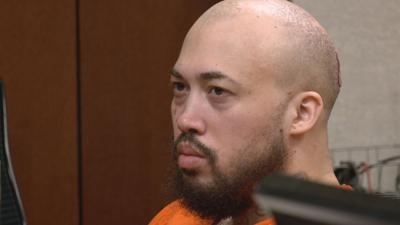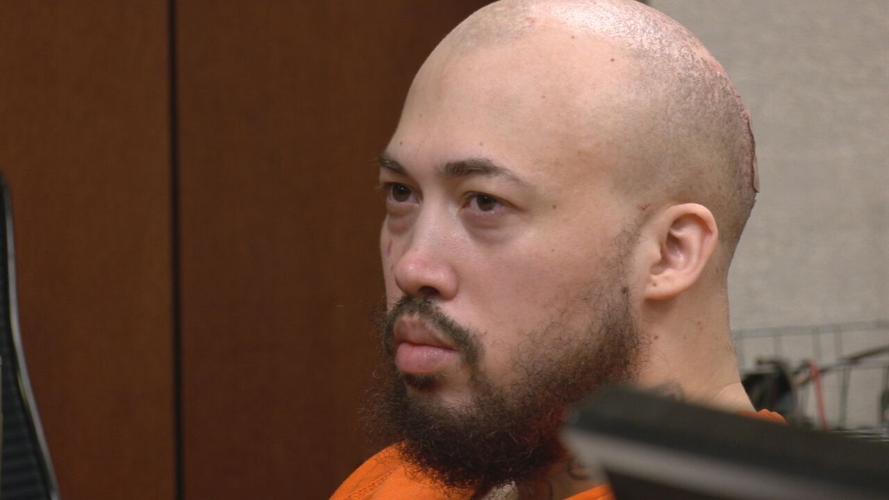LOUISVILLE, Ky. (WDRB) -- In the spring of 2016, Brice Rhodes was "callous and casual" when he shot and killed Christopher Jones, who he believed was another man that had a bounty out for his death, prosecutors said Tuesday.
Just a few weeks later, Rhodes was "calculating and cruel" when he brutally tortured and murdered two young brothers, Larry Ordway and Maurice Gordon, he believed were telling their family about the shooting, Assistant Commonwealth's Attorney Critt Cunningham said in his opening statements of Rhodes' triple murder trial.
And there is direct evidence pointing to Rhodes, whose nickname is "Rambo," as the mastermind of the murders, Cunningham said: Three other men who were part of the slayings have blamed Rhodes, and blood was found on the carpet in his apartment in Clifton where the brothers were tortured and stabbed to death.
But defense attorney Wesley Boyarski told the jury that one of the other men involved, Anjuan Carter - the prosecution's key witness - is the actual killer and there is little physical evidence linking Rhodes to the crime.
For example, she said, the only eyewitnesses to the murders were also involved, Rhodes' DNA was found only on the steering wheel of his car and the footprint and tire tracks in the area where the brothers' bodies were disposed of, after being set on fire, do not match Rhodes.
"The police had tunnel vision in this case," Boyarski said. "There is no clear motive for Brice to have committed these crimes."
Boyarski said several people saw the murder and asked why Rhodes would only kill the brothers.
"Does this make sense to you?" she said, noting that Carter got a "sweetheart" deal to testify against Rhodes but is already back in jail in Florida on gun charges.
The trial, which has been pending since 2016, is expected to last at least two or three weeks. He is facing a maximum sentence of life in prison.
Rhodes, 32, is charged with three counts of murder, tampering with physical evidence, abuse of a corpse and receiving stolen property.
Jefferson Circuit Court Judge Julie Kaelin found that while Rhodes is competent to stand trial, he is ineligible for the death penalty, ruling he has a documented history of serious mental illness or intellectual disability.
Rhodes has a history of outbursts in court, threatening at least one judge, accusing a prosecutor and another judge of having an affair, lashing out at several of his attorneys and calling several court officials racist.
He was told by Kaelin on Friday that he will be removed from court or shocked by an ankle monitor if he is disruptive during his trial starting next week.
Rhodes, who is wearing a suit and is not shackled, has so far been quiet, showing no emotion in court.
Cunningham told jurors that Rhodes shot Jones on May 4, 2016, on South 41st Street, believing he was someone else. Carter told police he was in the passenger seat, Gordon was the "getaway driver" and Rhodes and Ordway were in the back seat when the shooting occurred, according to court records.
Jones died at the hospital.
Rhodes, according to Cunningham, heard that Gordon, 16, and Ordway, 14, were telling family members about the murder, so he brought them to his home on May 22, 2016.
After a brief scuffle, Gordon was tied up and a toboggan placed over his head, while Ordway was moved into a bathroom where he listened to his brother scream and "beg for forgiveness," Cunningham said.
Rhodes – and other men at the home – beat and stabbed Gordon, then rolled his body out of the way and brought Ordway in and the "the process was started over," Cunningham told jurors.
The three then allegedly put the two brothers into a car and dumped them in the backyard of an abandoned house in the 400 block of River Park Drive, east of Shawnee Park, and burned the bodies. Carter has told police he stayed behind and cleaned up after the murders.
After the murder, Elizabeth Wren, the mother of the teen brothers, called one of their cell phones and Carter, who had taken it, answered.
Boyarski said Wren had dated Rhodes and "hated him." She argued that Louisville Metro Police had "tunnel vision," focusing solely on Rhodes at the exclusion of other suspects.
In addition, Boyarski said police lost evidence and lied about it. And she said the first search of Rhodes' home turned up no evidence.
"If at first you don't succeed, try, try again," she told jurors, noting that police searched the home a second time and say they found blood.
At one point, Boyarski told jurors to "remember, this was the same police department that murdered Breonna Taylor." Prosecutors quickly objected and Kaelin then told the jury there is no proof of a connection between the two cases and to ignore the comment.
Boyarski moved on but continued to question the actions of police.
"I'm here to make sure no one is wrongfully convicted," Boyarski said. "And that's why you are here."
Related Stories:
- Brice Rhodes told he will be 'shocked' by device or removed from murder trial if he causes disruption
- Louisville judge rules triple-murder defendant Brice Rhodes is not eligible for the death penalty
- VIDEO | Alleged triple murderer Brice Rhodes asks judge if he's 'secret KKK member'
- Accused triple murderer Brice Rhodes threatens Louisville judge, claims attorneys are racist
- Louisville triple murder suspect's court behavior angers grandmother of his alleged victims
- RAW VIDEO | Mother tells WDRB why she believes her 2 sons were murdered
- Louisville man arrested for three murders, including two teens found in Shawnee neighborhood
Copyright 2023 WDRB Media. All Rights Reserved.















